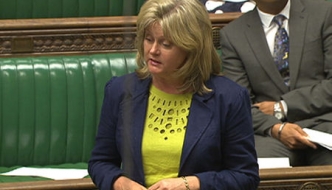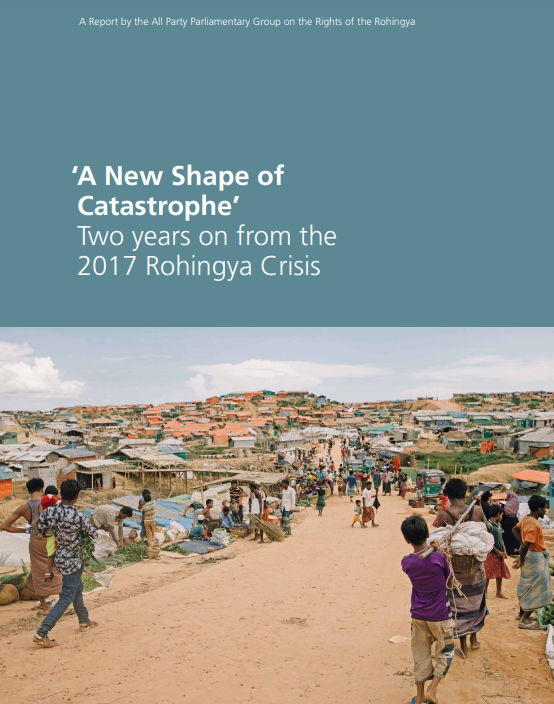Let’s get the ‘right deal and right formula’ for St Albans, argues Anne Main MP
Yesterday in the House of Commons, Anne Main warned against the ‘democratic deficit’ created by the Scottish Referendum and argued strongly for the ‘right deal and right formula’ for public spending in St Albans.
Anne also praised St Albans City and District Council for freezing council tax for the seventh year in-a-row, but cautioned that St Albans ‘constituents find it difficult when they see people north of the border having more money spent on their services.
‘Far less money is spent on my constituents and I find it hard to justify to them that in my constituency, which contains areas of multiple deprivation, people get some 11% less than the UK average, 23% less than Scotland gets and 28% less than Northern Ireland’.
After the debate, Anne commented that she ‘accepts that is it right and proper we have a re-distribution of wealth, however, the Barnett Formula does not currently take into consideration the needs of the different parts of the UK. It is a block grant.’
Since the Independence campaign the Government have been working to a timetable to address concerns of Scottish voters who voted for the Union on the understanding of greater autonomy for Scotland.
Anne said the ‘The logical conclusion of our giving powers to Scotland is that we should recognise the democratic deficit that it has created in our own Parliament. That needs to be addressed.’
One of the competencies that has already been devolved to the Scottish Government is stamp duty. Anne said ‘This is a subject that I am particularly passionate about, because Scottish Members could potentially vote on stamp duty in England.’ The current constitutional settlement would allow Scotland’s MPs to vote on stamp duty in England, although this matter is wholly devolved to the Scottish Parliament.
‘Let us get the right deal and the right formula. That right formula must be obtained for constituencies such as mine, which say that it is not fair that people in Scotland who have no interest in the stamp duty in St Albans may have a say on it, whereas my constituency will have no say on stamp duty levels in Scotland. Let us recognise that democratic deficit. Let us ensure that we have a fair deal. I cannot see why anyone on the Opposition Benches would argue against a fair deal for their constituencies in England—they would have to explain to their own electorate why they would like to remain in an unfair scenario created as a result of the referendum vote.’
FULL TEXT:
Mrs Anne Main (St Albans) (Con): I apologise for missing the first few remarks made by my hon. Friend the Member for Esher and Walton (Mr Raab). I should like to say that it was a pleasure to listen to the hon. Member for Birmingham, Hall Green (Mr Godsiff), but it kind of wasn’t, really. It was disappointing to hear the suggestion from the Opposition that the devolution of powers is a way of splitting up the Union by the back door. I do not believe that it ought to be, or that it was ever meant to be. Scotland voted to remain part of the Union, and I am very glad that it did so.
Powers have gone to Wales and Scotland, and quite rightly so. They should have a say over how they run certain important matters that are particular to them. This cannot be a one-way street, however. We cannot give powers back and not expect that to have an impact on the workings of this place. Inevitably, there will be subjects relating to Scotland and Wales that we will be expected not to vote on. Stamp duty could well be one of them. This is a subject that I am particularly passionate about, because Scottish Members could potentially vote on stamp duty in England. According to the latest figures, my constituency pays more stamp duty than Scotland and Wales put together, and I find it amazing that I would have no say over stamp duty in Scotland, yet Scotland could well have a vote on stamp duty in my constituency. That is rather bizarre.
The logical conclusion of our giving powers to Scotland is that we should recognise the democratic deficit that it has created in our own Parliament. That needs to be addressed. I accept that we have a united Parliament, but that does not mean that we cannot come up with a system that recognises the new arrangements. We do not need to create a whole new English Parliament, as the hon. Member for Birmingham, Hall Green suggested, but we need to observe custom and practice and say that there are certain things that hon. Members from Scotland or Wales should not participate in. That would be a fair situation.
Naomi Long (Belfast East) (Alliance): I remind the hon. Lady that Northern Ireland remains part of the United Kingdom, in case we are in any doubt. Does she agree that a similar approach should be taken when reserved and excepted matters for Northern Ireland that affect only Northern Ireland are voted on in this place? On those occasions, where Northern Ireland Members have agreed on a certain course of action we are often overruled by English MPs.
Mrs Main: The hon. Lady makes an interesting point, and I am certain that there would be no reason why, if the motion is carried today, everything could not be on the table for discussion. It would be up to her to make her case, but I think that what she describes is very different from what the hon. Member for Birmingham, Hall Green was suggesting, which was that we have to split up the whole of the Union into little tranches of competences. It would be unrealistic, and it would certainly result in a democratic deficit, to suggest that people in Scotland can have grabbed power for themselves, and rightly want to use it, but resist giving away any of their powers in this place. I know it suits the Labour party to try to keep those powers, but we have to make the case that it is not reasonable and not fair.
Lord Barnett has said the following about the Barnett formula:
“It is unfair and should be stopped, it is a mistake. This way is terrible and can never be sustainable, it is a national embarrassment and personally embarrassing to me as well.”
I do not believe we should scrap the Barnett formula, but we should certainly review it, and whatever comes out of that would be done with the will of the House. Far less money is spent on my constituents and I find it hard to justify to them that in my constituency, which contains areas of multiple deprivation, people get some 11% less than the UK average, 23% less than Scotland gets and 28% less than Northern Ireland gets.
Mr MacNeil: rose—
Mrs Main: I will not give way. I am sure that many MPs on the Benches around the hon. Gentleman want to make the case for the Scottish National party.
Because of the flaws I am outlining—[Interruption.] My constituency is not in London. St Albans is in a county above London, and we are not part of the London development system up there, but we have to pay a high price for our properties. My constituents do not understand why they are net contributors to the Chancellor’s coffers and do so badly when they are trying to get services—
Pete Wishart (Perth and North Perthshire) (SNP): Will the hon. Lady give way on that point? She cannot get away from it.
Mrs Main: I can get away from it—I can ask the hon. Gentleman to sit down. My constituents are as much in need of services as any other constituents. [Interruption.] If he wishes to make his speech when he gets to have his turn, fair enough, but please stop barracking me from the Opposition Benches. My constituents are entitled to expect a decent level of services, and it is hard to provide that when the formula is so skewed in the way that it is. We should look at it and review it.
Pete Wishart: On that point—
Mrs Main: I think I have made it clear to the hon. Gentleman that I do not intend to give way on the Barnett formula; my constituents are very exercised about it. St Albans city & district council—Conservative-led—has frozen council tax for the seventh year in a row, but people cannot expect to have money come out of nowhere. My constituents find it difficult when they see people north of the border having far more money spent on their services.
People have talked about respecting the views of Scotland when it voted on independence. It is a shame the SNP does not do that, because it seems as though this is a “neverendum” campaign—it is as though the vote never happened. It is as though it has just been a blip on the road to still delivering independence. So may I say to SNP Members that the vote was lost? They may not have noticed that. Its new leader—as of today—has said recently:
“I want this party of ours, this movement of which we’re so proud to belong, to keep making the case for Scotland being an independent country.”
As such a large amount of Scots’ money has been spent on this—about £14 million, I believe—may I suggest that we rest the matter for a while and now try to address the democratic deficit that has come out of it? The campaign for independence was lost and now we have to ask how we get a good deal for Scotland; as was promised.
The deal that was promised by all three leaders was that Scotland would have new powers and a fair deal under a Barnett formula or something like a Barnett formula—I do not know what it will be called. Inevitably, as has been said, times move on. The argument has moved on from all the power being here to the power being shared out by those who best know how to use it—I am sure the Scots would not object to that description—for their own local communities, so that shows that the argument has moved on from independence. It is time we drop the “neverendum” campaign, constantly dangling the prospect of independence, and say, “Let us get the right deal and the right formula.” That right formula must be obtained for constituencies such as mine, which say that it is not fair that people in Scotland who have no interest in the stamp duty in St Albans may have a say on it, whereas my constituency will have no say on stamp duty levels in Scotland. Let us recognise that democratic deficit. Let us ensure that we have a fair deal. I cannot see why anyone on the Opposition Benches would argue against a fair deal for their constituencies in England—they would have to explain to their own electorate why they would like to remain in an unfair scenario created as a result of the referendum vote.

DISSOLUTION OF PARLIAMENT
Watch: Anne Main, chair of the All Party Parliamentary Group on Bangladesh, talks about the Rohingya crisis and urges support for @DECappeal pic.twitter.com/FFL0lq8O0A
— DFID (@DFID_UK) October 12, 2017

